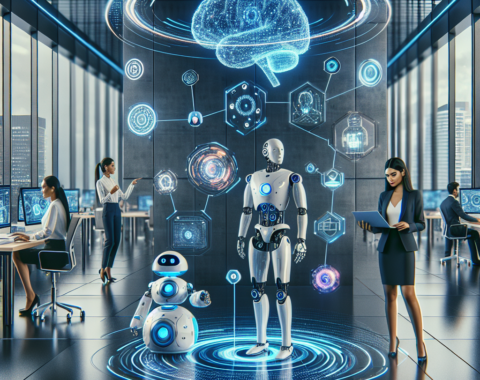
AI Experts Urge Safeguards to Mitigate Potential Catastrophic Risks
Introduction
The rapid progress in artificial intelligence (AI) has brought profound transformations across multiple sectors of our society. From healthcare innovations to autonomous vehicles, the possibilities seem endless. However, with these advancements come significant risks and ethical considerations that must be addressed. Recently, leading AI experts have sounded the alarm, stressing the urgent need for robust safeguards to mitigate potential catastrophic risks associated with AI technologies.
Understanding AI Risks
AI, being a double-edged sword, presents both opportunities and potential dangers. As it becomes increasingly integrated into our daily lives, the conversation around its safety and ethical implications grows more pressing.
Potential Risks of AI
– Unintended Consequences: As AI systems become more autonomous, it can become challenging to predict their actions and potential consequences.
– Ethical Concerns: The deployment of AI often raises moral questions, such as privacy invasions, biased algorithms, and surveillance issues.
– Job Displacement: Automation through AI could lead to significant job losses in various sectors, impacting economic stability.
– Hello World predicts collapse of financial markets: An AI system’s misinterpretation or incorrect analysis could potentially lead to economic disruptions.
The Need for Safeguards
Given these risks, **implementing safeguards becomes critical** to ensuring that the benefits of AI outweigh the potential downsides. There is a paramount concern among experts that without adequate oversight and regulation, AI could result in catastrophic outcomes.
The Role of AI Experts
As pioneers in the field, AI experts are at the forefront of advocating for these necessary measures. Their insights and analyses are essential in shaping policies that govern AI usage and its ethical considerations.
Key Recommendations from AI Experts
1. **Establishing Transparency and Accountability:**
– AI systems should be developed with *transparency* in mind. Understanding how these systems make decisions is crucial for accountability.
– Developers and organizations must be held accountable for the AI technologies they create and deploy, ensuring they align with ethical standards.
2. **Developing Ethical Guidelines:**
– Ethical frameworks are necessary to guide AI development and deployment.
– These guidelines should focus on *fairness*, *equity*, and *justice*, ensuring that AI technologies do not perpetuate existing biases or create new ones.
3. **Promoting Interdisciplinary Collaboration:**
– Integrating insights from various technical, legal, and ethical disciplines is vital for comprehensive AI safety strategies.
– Encouraging collaboration between sectors will foster innovations that are both effective and responsible.
4. **Implementing a Robust Review System:**
– Regular assessments and reviews are necessary to identify and address any potential risks early in the development process.
– Independent third-party audits can provide objective evaluations of AI technologies.
Building a Culture of Safety
Beyond technical safeguards, fostering a culture of safety within organizations deploying AI is crucial. By emphasizing the importance of ethical practices and safety protocols, organizations can create an environment where AI is used responsibly and safely.
The Path Forward
AI experts urge for both immediate and long-term actions to be taken, ensuring a more secure future with AI. This involves proactive measures from governments, corporations, and individuals alike.
Steps Towards a Safer AI Future
**Government Regulations:**
– Governments need to establish comprehensive regulatory frameworks that address the potential risks of AI technologies.
– International cooperation is also necessary, given the global nature of AI development and deployment.
**Corporate Responsibility:**
– Corporations must prioritize ethical AI development, focusing on creating technologies that contribute positively to society.
– Investing in AI safety research and training programs can further enhance responsible AI deployment.
**Public Awareness and Education:**
– Increasing public understanding and awareness about AI risks and benefits is essential for informed decision-making.
– Educational programs can empower individuals to engage critically with AI technologies and advocate for responsible practices.
Conclusion
As AI continues to reshape our world, the call for safeguards to mitigate its potential catastrophic risks becomes more urgent. By heeding the recommendations of AI experts and embracing transparency, accountability, and ethical considerations, society can harness the transformative potential of AI while safeguarding against its inherent risks. Through collaboration, regulation, and education, we can pave the way for a future where AI technologies contribute positively to human progress and well-being.




